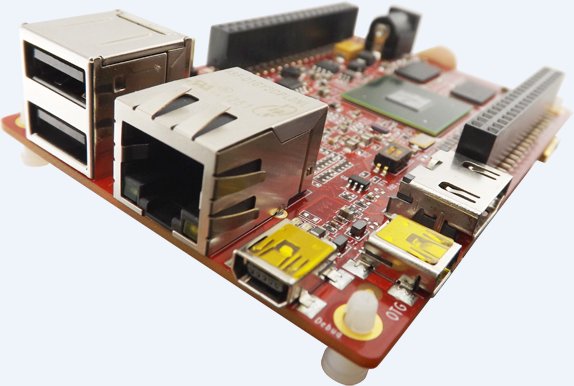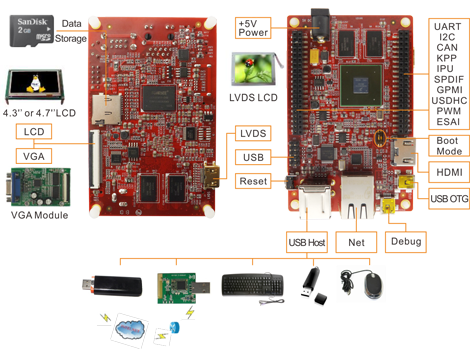Embest, a subsidiary of Element14, has just announced the MarS Board, a development board powered by Freescale i.MX6 Dual (2x Cortex A9) with 1 GB RAM and 4GB eMMC flash. This is not related to the Marsboard based on AllWinner A10, and designed & manufactured by another company.
Here are the key features of the MarS Board:
- SoC – Freescale i.MX6 Dual 2xCortex-A9 Processor @ 1GHz + Vivante GC2000 GPU.
- System Memory – 1GB RAM (4*256MB DDR3 SDRAM)
- Storage – 4GB eMMC + micro SD card slot (up to 32GByte)
- Video Output – 1xHDMI interface, 1x LVDS interface and 1x LCD interface
- USB – 4x USB Host ports (2x USB connector, 2x via headers), 1x mini USB OTG port, and 1x mini USB for debug
- Connectivity – 10/100M/1Gbps RJ45 Ethernet interface
- 2 Expansion Hearders – 2x CAN, 2x IIC, Audio & SPDIF, 8bit IPU1(Camera), SPI, USDHC1(SD card), 4x UART, 2x PWM, GPMI, 6x GPIO
- Power Supply – 5V/4A
- Dimension – 65mm x 102mm
The company will provide support for Linux 3.0.15, Android 4.0.4 & uCOS-II RTOS.
That means we now have low cost (<$100) platforms for most i.MX6 processors (expect Solo Lite) with GK802 (i.MX6 Quad), Wandboard Solo (i.MX6 Solo), Wanboard Dual (i.MX6 Dual Lite) and the MarS Board featuring i.MX6 Dual. The closest competitor to the MarS Board is the Wandboard Dual, and both sell for $99. Thanks to the Dual version, MarS supports 1080p60 video decoding (vs. 1080p30), and features Vivante GC2000 GPU (vs. Vivante GC880) compared to the Wandboard Dual. It also comes LVDS and LCD connectors, and an eMMC that should provide better performance than the micro SD used in the Wandboard. The Wandboard, however, has more audio I/O including S/PDIF, comes with built-in Wi-Fi and Bluetooth, and its baseboard / SoM makes upgrading possible.
A big disappointment with the MarS Board is that although SATA-II support is integrated into i.MX6 Dual, the company apparently did not feel necessary to add a SATA connector *facepalm*, and I’ve been confirmed SATA signals are not available via the expansion headers either.
The board will be available in May 2013 for $99. You can find more information and register your interest on MarS Board page.

Jean-Luc started CNX Software in 2010 as a part-time endeavor, before quitting his job as a software engineering manager, and starting to write daily news, and reviews full time later in 2011.
Support CNX Software! Donate via cryptocurrencies, become a Patron on Patreon, or purchase goods on Amazon or Aliexpress






